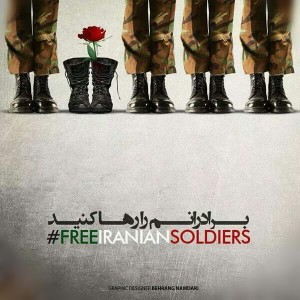 It’s supposed to be the responsibility of governments to protect their citizens’ lives. One can find many occasions in history on which governments made serious compromises in order to shield their citizens from harm, the case of the British marines or the American climbers arrested by Iranian authorities are only two examples. Take a look below to figure how Iranian government react in similar situations.
It’s supposed to be the responsibility of governments to protect their citizens’ lives. One can find many occasions in history on which governments made serious compromises in order to shield their citizens from harm, the case of the British marines or the American climbers arrested by Iranian authorities are only two examples. Take a look below to figure how Iranian government react in similar situations.
Last year, Syria:
A group of supposed Iranian ‘pilgrims’ were captured by Syrian opposition forces. Despite the Islamic Republic’s claims, the group were military personnel and the Syrian opposition demanded a prisoners exchange in return for their release. The Islamic Republic got on to the case very swiftly and managed to convince Bashar al-Assad’s regime to release 2,130 opposition prisoners. (1) Many of these were supposedly ‘dangerous terrorists’, according to Syrian regime. In exchange, the 48 Sepah Pasdaran members’ were released.
Less than 2 month ago, Iran:
Five young Iranian border guards were abducted by the Jeish al-Adl militia Sunni group while serving their mandatory military service in Balouchestan, Iran. The Pakistan-based group later stated (2) the abduction was carried out in reaction to the execution of 15 Balouch prisoners and to an ‘insulting’ speech by Ayatollah Mesbah Yazdi, in which he introduced Othman, the third Islamic Caliph, as a ‘worldly-minded, sectarian individual’. (3)
Jesh al-Adl asked for a number of Balouch Sunni prisoners to be release in exchange for releasing the Iranian soldiers. Not only no one was released, but a Balouch Sunni prisoner – Ali Narouie, who apparently had close personal relations with the head of Jeish al-Adl – was executed in prison in Iran.
Despite the Iranian foreign ministry’s claims of following the case closely in coordination with Pakistan’s government, the Iranian public were soon shocked to find out that one of the captive soldiers, Jamshid Danaifar, had been executed. A Pakistani government spokesperson revealed that the Iranian government had stopped pursuing the case days before. Jeish al-Adl stated the execution was carried out in retaliation for the execution of Narouie and emphasized that, if their demands were not met in 10 days, the next soldier would pay the price.
One question that is bugging us at Naame Shaam is: what is the difference between these two groups of Iranian citizens in the eyes of Islamic Republic’s officials? How can they persuade another war-torn country to release a much larger number of prisoners but fail to negotiate the release of these five common soldiers?
References:
1. http://edition.cnn.com/2013/01/09/world/meast/syria-prisoner-exchange/
2. http://www.peykeiran.com/Content.aspx?ID=73022
3. http://www.digarban.com/node/16595
 English
English  فارسی
فارسی  العربية
العربية 




 On Twitter
On Twitter